What started as a mother looking to help her autistic son gain social skills turned into Little Red Hen, a nonprofit organization that gives those with developmental impairments the opportunity to work in agriculture.
The Chico, California-based therapeutic nursery was founded in 1997 by Teresa Wolk Hayes after she discovered that her son loved to work with water and soil.
Little Red Hen is now well-known in the region for hiring people with mental and physical disabilities by giving them job opportunities that cater to their needs and teaching them how to maintain a job — things most businesses are often not equipped to do for disabled workers. Little Red Hen’s staff members learn job-based skills like keeping inventory, cash handling, and selling, as well as other skills they can take home with them, all at their own pace.
“Every moment is a learning moment,” said Poppy Fields, manager of Little Red Hen Therapeutic Nursery. “A big part of what we do is socialization, having our staff members learn and improve their body language, communication skills, and eye contact.”
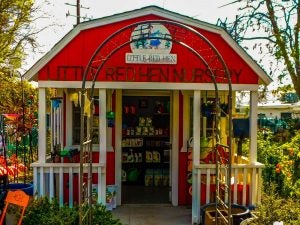
The nonprofit has numerous locations in Chico serving children and adults. While the first location was a therapeutic nursery, the other locations include a vintage store, a kitchen store, and a greenhouse. One hundred percent of Little Red Hen’s sales benefit programs for people with developmental disabilities.
“We have a waitlist of people who want to work for us,” Fields said. “We don’t believe in diminished wages for people with disabilities, we never pay below minimum wage, everyone can get promoted, and everyone can get raises. That is sadly not a regular practice with disabled people — a lot of people make very subpar wages, and we don’t believe that’s ethical.”
Fields has been the manager of Little Red Hen Therapeutic Nursery for a couple of years but has been working with the nonprofit for several more years in its other locations. During her time with the organization, she’s worked alongside many disabled staffers and has watched them all learn and grow.
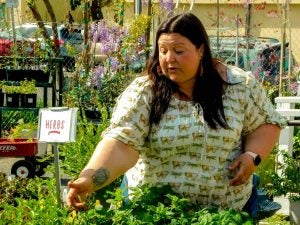
Staff members are taught skills they can use both in and out of the workplace. Aside from holding a job, part of what they do is learn skills like responsibility and time management. This way when they’re ready, they can take these learned skills and apply them toward their futures.
This does more than just help make them employable; they gain skills to be independent.
“Everyone deserves the right to work and the right to independence. It’s a very important part of life,” Fields said.
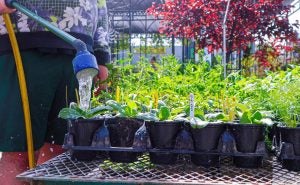
Disabled people are disproportionately underemployed in the United States compared to their able-bodied and neurotypical counterparts. In 2021, only about 19 percent of the nation’s disabled people were employed, while about 67 percent of able-bodied and neurotypical people were employed. Disable people who are employed often face workplace discrimination, such as harassment from coworkers and customers and being underpaid.
Information from the U.S. Department of Agriculture shows that between the years 2008 and 2016, about 500,000 of the nation’s farmers and farmworkers have had some form of disability. And that doesn’t even consider that many disabilities, including autism and attention deficit hyperactivity disorder, can go undiagnosed.
This is a lot of lost opportunities in agriculture for disable people.
“I want everyone to have opportunities,” Fields said. “If you don’t hire people with disabilities, figure out why, because working is a right.”
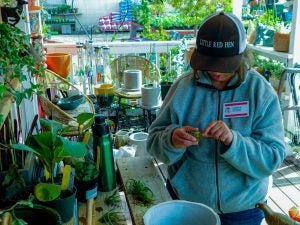
Fortunately, Little Red Hen helps to provide what Amanda N., a staff member at the nursery for nine years, describes as a “fun environment” and “enjoyable learning experience.”
“I like it a lot,” she said. “I really like learning new things about plants and how to care for them. It’s really enjoyable and easy to understand.”
Amanda developed an interest in house plants such as air plants — the kind of plants that grow by attaching themselves to other plants. She wants to continue learning more about plants and develop her customer service skills.
Amanda is not the only staff member who developed a strong interest in horticulture during her time at the nursery. Andrew E., a staff member for four years shared similar experiences.
“It’s a nice atmosphere here,” he said. “I get along well with my coworkers.”
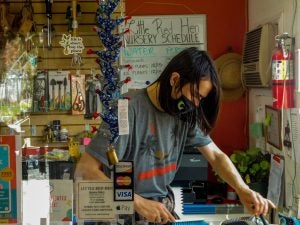
Though Andrew says his future does not involve horticulture (he is hoping to be in firefighting or emergency medicine), he’s always had an interest in agricultural and environmental science, he said. Working at the nursery has helped enhance his knowledge in the area and helped him practice skills — such as social skills — that he can use as he desires.
“The customers are usually nice,” he said. “Though there have been a few who were kind of impatient and could have been nicer.”
Regardless of any occurrences that may happen, that doesn’t stop staff like Amanda and Andrew from doing what they love. They hope that people understand that plants and gardening is for everyone, them included.
“We are still people despite our disabilities,” Amanda said. “If anyone out there feels that they can’t garden, I want them to know they can. It just takes a bit of help sometimes.”
Amanda started at the nursery having little to no interest in plants but is now much more open to learning new things, she said. Amanda plans to continue her experience at the nursery as of now.
Andrew wants people to know that just because staff such as himself may seem “different,” they’re still people with feelings.
“I think we can all learn some patience,” he said. “Taking a second to think before making assumptions about people would do the world a lot of good.”
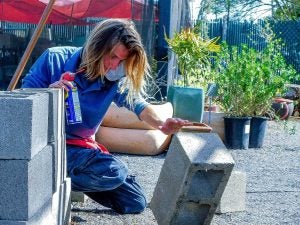
For Fields, working with disabled people has been a pleasurable experience, she said. “Everyone else is missing out on so much by not hiring people with disabilities.”
“Our staff love their jobs and helping customers, and they’re always learning,” Fields said. “They love seeing their accomplishments. It puts your life in perspective and makes you notice how much we take things for granted as far as what we can do.”
Given the success of Little Red Hen, Fields is hopeful for the future.
“I hope we can continue to grow at a pace to keep up with the demand,” she said. “Hopefully we can expand our business and locations, because I would love to see these everywhere.”
Saul Reyes serves as the 2022 American Farmland Trust Agriculture Communications Intern at AGDAILY, with a focus on helping to amplify diversity and minority voices in agriculture. An FFA alum, Reyes is a student at California State University-Chico and is double majoring in plant and soil science and multicultural and gender studies, while minoring in intersectional Chicanx/Latinx studies and public relations. He can be found on Twitter @sreyes710.





